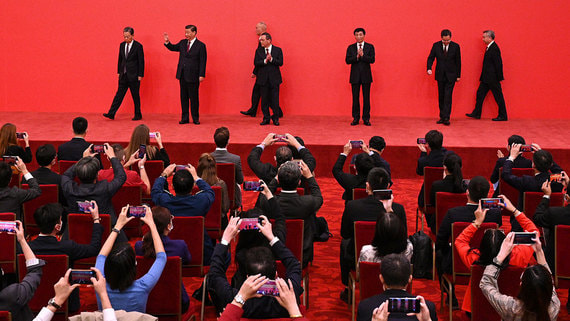Politburo of the Central Committee of the Communist Party of China worries investors about less publicity in their work
[ad_1]

The Politburo of the Central Committee of the Communist Party of China (CCP), which has had 24 members since October 2022, updated at the 20th CPC Congress, has given investors cause for concern due to less frequent reports on its work, writes Bloomberg. Since the 20th CPC Congress, this revamped governing body, which traditionally met once a month, has not released information about its meetings in November 2022 and January and May 2023. such reports appeared monthly in 90% of cases. During the previous five-year period, from 2017 to 2022, there were only three such passes. Although public reports in the media are usually very general, they gave investors an idea of the actions of the country’s leadership. The value of the company’s shares depended on changes in the tone of these messages or the plans made public.
The Politburo of the CPC Central Committee is the governing body of the Communist Party of China, which acts as the Central Committee in the intervals between plenums (held seven times in five years). The main governing body of the country is the Standing Committee (PC) of the Politburo of the CPC Central Committee, which includes seven people headed by Xi Jinping.
Among Bloomberg’s versions, the meetings of the Politburo were simply not held in the months mentioned (this is possible) or some too sensitive issues were on their agenda.
On June 1, Xinhua News Agency broke the news that the Politburo of the CPC Central Committee held the fifth collective exercise on May 29 “to transform China into a power with enormous potential in the field of education.” Xi Jinping presided. The collective study of members of the Politburo of the CPC Central Committee took place in January as well. However, China’s state media sometimes publish Xi’s speeches from party events only months later.
“An unintended consequence of such silence <...> is that people don’t know how to distinguish between rumors and official policy,” Alicia Garcia Herrero, chief economist at Natixis SA for the Asia-Pacific region, told the agency. According to her, a lack of understanding of the political situation pushes investors to more restrained behavior or the need to take more risks. Investors are also paying attention to the general trend of recent months towards greater closeness in China. Bloomberg believes that Chinese authorities may seek to limit the spread of information due to the growing US attention to its technology industry and cooperation with Russia.
It is hard to imagine that even people who follow the international agenda are closely watching the work of the Politburo of the CPC Central Committee, says Andrey Karneev, head of the HSE School of Oriental Studies. The practice of publishing information about the work of this body appeared in the PRC not so long ago – approximately from the moment Xi’s predecessor Hu Jintao came to power in 2002, who was very proud of such democratization. Openness in the reports has always been limited – they only indicate the topics that were discussed at the meeting. The lack of publications lately may indeed be connected with some processes in the highest echelon of power, or maybe with technical details, but so far it is not worth drawing certain conclusions, Karneev concludes.
[ad_2]
Source link








